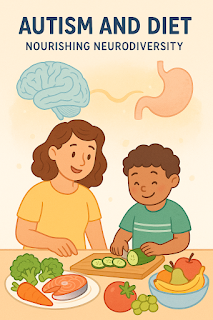🧠 Autism and Diet: Can Nutrition Affect Symptoms?
Published by Neuronest Collective Team
“It’s OK to be different.”
---
For many parents and caregivers of children with autism, managing behaviors and promoting well-being is a daily priority. One question that often arises is: Can diet make a difference in how autistic individuals experience the world?
Let’s explore what the science says, what families report, and which dietary strategies may help support autistic individuals holistically.
---
🍎 The Gut-Brain Connection
Research has increasingly highlighted a powerful link between the gut and brain—commonly called the gut-brain axis. Many autistic individuals experience gastrointestinal issues, such as constipation, bloating, or diarrhea, which can affect mood, focus, and behavior.
Some key facts:
Gut bacteria influence neurotransmitters like serotonin.
Inflammation in the digestive system may impact the brain’s regulation of emotions and behavior.
A healthy gut may contribute to better energy levels, mood stability, and cognitive function.
---
🧂 Common Dietary Approaches in Autism
Here are some dietary strategies that families and professionals often explore:
1. Gluten-Free, Casein-Free (GFCF) Diet
What it is: Eliminates gluten (found in wheat, barley, rye) and casein (found in dairy).
Why it’s used: Some believe that certain peptides in these foods act like opioids in the brain, potentially affecting behavior.
Mixed evidence: Some families report improved communication and behavior, while research results are varied.
2. Low-Sugar, Whole Food Diet
Reducing refined sugar can help stabilize mood and energy.
Whole foods—like fruits, vegetables, lean protein, and complex carbs—support overall brain health.
3. Omega-3 Fatty Acids
Found in fish (like salmon), flaxseed, and walnuts.
May help with attention, anxiety, and brain development.
4. Elimination Diets
Identifies potential food sensitivities (like soy, corn, eggs) that could be triggering discomfort or behavioral changes.
---
🥦 Nutritional Deficiencies to Watch
Some autistic individuals may be picky eaters or have restricted diets due to sensory challenges. This can lead to deficiencies in:
Vitamin D
Iron
Zinc
Calcium
B Vitamins
A pediatrician or registered dietitian can help monitor and supplement these as needed.
---
⚠️ Important Notes Before Changing a Diet
Always consult a medical professional or nutritionist before starting any new diet.
Keep a food and behavior journal to observe patterns.
Nutritional approaches work best when part of a broader support plan (therapy, sensory support, communication strategies).
---
💬 What Families Say
Many caregivers report:
Improved sleep
Fewer meltdowns
Better focus
Increased eye contact and social engagement
But experiences vary. Nutrition is not a cure for autism, but it can support well-being, comfort, and function.
---
🧘 A Holistic Approach Matters
Food is just one piece of the puzzle. When combined with love, acceptance, structure, and therapy, nutrition can help create a more balanced environment for autistic individuals to thrive.
---
Let’s nourish the body, support the brain, and empower neurodiverse lives.
📌 Follow Neuronest Collective for more family-friendly tips on autism, Down syndrome, and children's mental health.




Comments